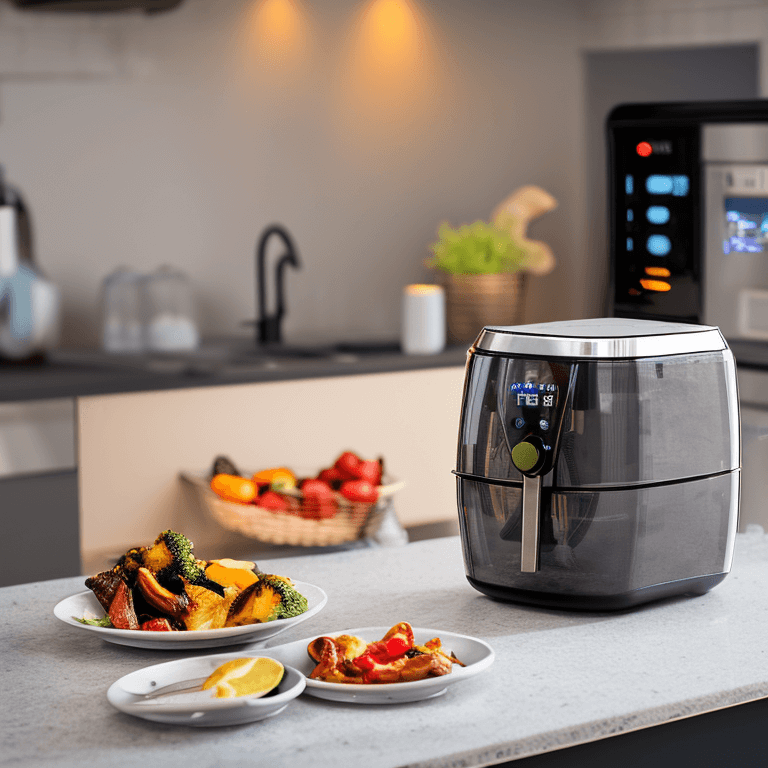
Yes, some glass can go in an air fryer, but not all types are safe. Heat-resistant glass like Pyrex or borosilicate can handle air fryer temperatures, while regular drinking glasses or decorative glassware may shatter. Always check the manufacturer's guidelines before placing any glass in your air fryer to avoid accidents or damage to your appliance.
Not all glass is created equal when it comes to air fryer safety. Oven-safe glass dishes, often labelled as tempered or borosilicate glass, are designed to withstand rapid temperature changes. These are the only types you should consider using in your air fryer. Regular glassware, like drinking glasses or decorative bowls, can crack or explode due to the intense, concentrated heat in an air fryer.
When shopping for air fryer-safe glassware, look for products specifically marked as oven-safe or heat-resistant up to at least 200°C. Many popular brands like Pyrex and Anchor Hocking produce suitable options. Remember that even approved glassware needs proper handling—always preheat your air fryer gradually and avoid placing cold glass directly into a hot air fryer basket.
If you've confirmed your glass dish is air fryer-safe, there are still important precautions to follow. Never fill the dish more than halfway, as food expansion could cause spills or uneven cooking. Place the glass container in the centre of the air fryer basket to ensure proper air circulation, and consider using a trivet or silicone mat underneath for extra stability.
Using inappropriate glassware in your air fryer can lead to several problems beyond just broken dishes. Shattered glass can damage your air fryer's heating elements or fan, potentially ruining the appliance. There's also a significant safety risk from flying glass shards or hot food spills, which could cause burns or other injuries in your kitchen.
Another often-overlooked issue is how glass affects cooking performance. Thick glass dishes may block air circulation, leading to unevenly cooked food. This defeats one of the main benefits of air frying—the crisp, even results you expect. For best cooking outcomes, check out our air fryer recipes that specify the ideal cookware for each dish.
If you're unsure about using glass, consider safer alternatives like silicone bakeware or air fryer-specific metal pans. These materials are designed to withstand high temperatures and promote better air flow. Silicone dishes are particularly versatile, as they're flexible for easy food removal and often dishwasher-safe for simple cleaning.
Proper cleaning is essential for maintaining glass cookware used in air fryers. Allow the glass to cool completely before washing to prevent thermal shock. Soak stubborn food residues in warm soapy water rather than scrubbing aggressively, which can create microscopic scratches that weaken the glass over time.
For tough stains or baked-on grease, try our recommended air fryer cleaner solutions that work well on glass too. Regular maintenance will extend the life of your glass cookware and ensure safe cooking for future meals. Remember that damaged or chipped glass should never be used in an air fryer, as imperfections can lead to breakage under heat stress.
Glass works particularly well for certain air fryer dishes like custards, crumbles, or baked pasta. The even heat distribution helps prevent burning on delicate foods that require gentle cooking. For more inspiration, browse our dessert recipes that showcase glassware's advantages in air frying.
Always consult both your air fryer's manual and the glassware manufacturer's instructions before combining the two. Some air fryer brands explicitly prohibit glass use, while others provide specific size limitations or placement instructions. These guidelines exist for your safety and to prevent voiding warranties.
When in doubt, err on the side of caution—it's better to use an approved alternative than risk damage or injury. For comprehensive guidance on cookware compatibility, our air fryer conversion chart includes temperature recommendations for various materials, including heat-resistant glass.
Watch for warning signs like cloudiness, fine cracks, or pitting on glass surfaces—these indicate wear that makes the dish unsafe for high-heat cooking. If you notice any odd noises (like pinging or cracking sounds) during air frying, turn off the appliance immediately and let everything cool before inspection.